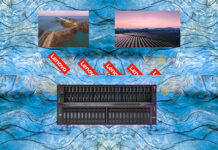MaxLinear has launched the MxL8900 storage accelerator as an upgrade to its MxL8800 series, lowering latency and adding upcoming support for PCIe 5.
MaxLinear’s Panther III accelerator cards are similar to DPU (data processing unit) add-in cards, but more akin to CPU-offload cards – taking on compression, deduplication, and encode/decide functions from a host server CPU, doing them much faster and using less electricity. It claims data reduction ratios of up to 15:1 with structured data and 12:1 with unstructured data, increasing the effective capacity of NVMe SSDs by up to 15x and 12x respectively.
The MxL8800 series product range provides PCIe 3 and 4 support, and from 25 to 200 Gbit/sec throughput with encode/decode latencies of <60us/27μs. Up to 16 of the cards can be cascaded together to increase the throughput numbers to 400 to 3,200 Gbit/sec respectively.
MaxLinear marketing director Mark Moran spoke at a June IT Press Tour in Silicon Valley about the new products. Moran described the Panther product, saying: “We don’t necessarily call it a DPU anymore, because the term DPU has been taken over by the SmartNIC and people have now associated the DPU to something that has Arm processors inside of it. I don’t have Arm processors inside of mine because they would run too slow. We call it a storage accelerator.”

The newer MxL8900 series products don’t change the throughput numbers, but have lower encode/decode latencies : 40us/25μs.

Moran said that Panther’s appeal as a storage drive physical space saver, with its 12:1 effective capacity increase and its consequent electricity draw reduction. Imagine every 12 drives being replaced by one, meaning power- and space-constrained datacenters could use Panther cards to keep up with AI-related storage demand.
He said: “Everybody wants to go off and buy AI today … The next question is, can I try and get all my data and how do I store it? Basically, people are wanting to route, generate, analyze, and store their data. They want to store this data securely, and they want to store all the data.
“Every year, we increase the amount of data we create. What you probably don’t realize is we only store a very small fraction of that data we create … All of a sudden now that everybody has AI this is becoming a big issue. They want to store all their data because they don’t know which data is going to be valuable anymore.”
Enter the Panther card, which can turn a server with 8x 10TB NVMe SSD capacity into an effective 960TB capacity machine and its cost per effective GB goes down.
According to Moran, PCIe 5 support is forthcoming, although he did not provide any performance numbers. As the gen 5 bus is twice as fast as the gen 4 PCIe spec, we expect throughput numbers will rise. About possible new features, Moran only said: “Being able to offload more deduplication is on the list. Being able to do better compression is on the list [with] new levels of compression potentially on the list.”
MaxLinear sells both the Panther chip and the Panther card to OEMs, one of which is Dell.








